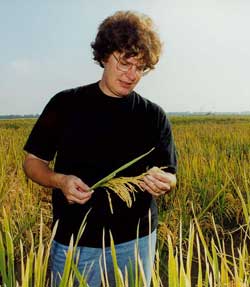Stuttgart, Arkansas
December 21, 2004
 More
than half the rice planted in Arkansas in 2004 was of varieties
developed by the University of
Arkansas Division of Agriculture, said Dr. Karen Moldenhauer
(photo), rice breeder and geneticist at the Rice Research and
Extension Center. More
than half the rice planted in Arkansas in 2004 was of varieties
developed by the University of
Arkansas Division of Agriculture, said Dr. Karen Moldenhauer
(photo), rice breeder and geneticist at the Rice Research and
Extension Center.
Fifty-one percent of the rice grown in Arkansas in 2004 was of
varieties developed in the Arkansas rice variety improvement
program, Moldenhauer said.
“Arkansas farmers produce more than 45 percent of the rice grown
in the United States under dynamic production conditions that
differ from those in other rice-growing areas,” Moldenhauer
said. “Because of this prominence, Arkansas rice farmers depend
on the Arkansas rice variety improvement program.”
Rice breeders Moldenhauer and Dr. James Gibbons work with
Division of Agriculture plant pathologists, entomologists, soil
scientists, weed scientists and others in cooperation with
scientists in other states and the USDA to provide a progression
of improved varieties.
Seventeen varieties have been released from the Arkansas
breeding program since 1980, Moldenhauer said. Genetic
improvement in disease resistance, plant types, grain and
milling yields, quality and other traits have helped increase
yield and grain quality while controlling production costs. Each
variety comes with management recommendations developed through
research on plant nutrients, diseases, insect pests, weeds and
other areas.
Improved high-yielding varieties like Frances, Wells and Ahrent
have had a big impact on the state’s agricultural economy. The
average rough rice yield in Arkansas was 4,110 pounds per acre
in 1980, Moldenhauer said. A record 6,800 pounds per acre was
produced in 2004.
“Assigning a conservative value of 60 percent of this 2,690
pounds per acre yield increase to new varieties, the average
monetary gain in 2004 would be about $179 million for the 1.56
million acres of rice grown in Arkansas, of which some $91.3
million is due to the new Arkansas varieties,” she said.
Arkansas rice producers provide check-off funds administered by
the Arkansas Rice Research and Promotion Board to help support a
dynamic rice breeding program by Arkansas scientists in
cooperation with researchers in other states and the USDA.
Check-off funding for the breeding program was started in 1980
and has increased substantially over the years.
“We’re continually working toward new varieties with higher
yields, improved disease and pests resistance, superior grain
and milling characteristics and other traits that will give
Arkansas producers advantages in the field and the marketplace,”
Moldenhauer said. |